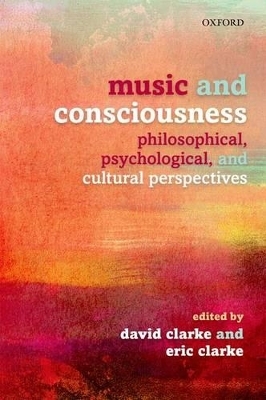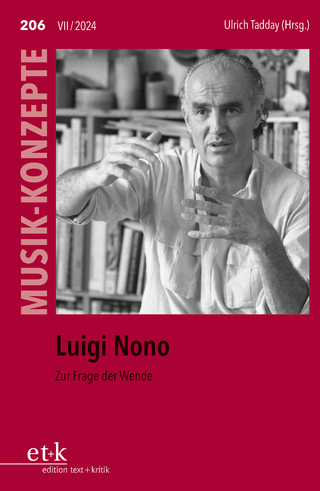
Music and Consciousness
Oxford University Press (Verlag)
978-0-19-955379-2 (ISBN)
What is consciousness? Why and when do we have it? Where does it come from, and how does it relate to the lump of squishy grey matter in our heads, or to our material and social worlds? While neuroscientists, philosophers, psychologists, historians, and cultural theorists offer widely different perspectives on these fundamental questions concerning what it is like to be human, most agree that consciousness represents a 'hard problem'.
The emergence of consciousness studies as a multidisciplinary discourse addressing these issues has often been associated with rapid advances in neuroscience-perhaps giving the impression that the arts and humanities have arrived late at the debating table. The longer historical view suggests otherwise, but it is probably true that music has been under-represented in accounts of consciousness. Music and Consciousness aims to redress the balance: its twenty essays offer a timely and multi-faceted contribution to consciousness studies, critically examining some of the existing debates and raising new questions.
The collection makes it clear that to understand consciousness we need to do much more than just look at brains: studying music demonstrates that consciousness is as much to do with minds, bodies, culture, and history. Incorporating several chapters that move outside Western philosophical traditions, Music and Consciousness corrects any perception that the study of consciousness is a purely occidental preoccupation. And in addition to what it says about consciousness the volume also presents a distinctive and thought-provoking configuration of new writings about music.
David Clarke is Professor of Music at the University of Newcastle upon Tyne. He is a music theorist in the broadest sense, interested in analytical, philosophical, and cultural approaches to musical and meaning. These concerns have informed his work on the British composer, Michael Tippett, on whom he is a leading authority and the author of several books and essays. Similar priorities have also shaped his recent research into cultural pluralism and musical postmodernism-which has yielded articles on Eminem, 'Elvis and Darmstadt', and BBC Radio 3's 'Late Junction'. David Clarke is also a practicing musician-a violinist and conductor, and lately a vocalist in the North Indian khyal tradition. Eric Clarke is Heather Professor of Music at Oxford, and Professorial Fellow of Wadham College. He has published widely on various issues in the psychology of music, musical meaning, and the analysis of pop music, including Empirical Musicology (OUP 2004, co-edited with Nicholas Cook), Ways of Listening (OUP 2005), The Cambridge Companion to Recorded Music (CUP 2009, co-edited with Nicholas Cook, Daniel Leech-Wilkinson and John Rink) and Music and Mind in Everyday Life (OUP 2010, co-authored with Nicola Dibben and Stephanie Pitts). He was an Associate Director of the AHRC Research Centre for the History and Analysis of Recorded Music, and is an Associate Director of the successor Centre for Musical Performance as Creative Practice (2009-14). He is on a number of editorial boards, and was elected a Fellow of the British Academy in 2010.
1. Music, phenomenology, time consciousness: meditations after Husserl. ; 2. Phenomenology and the hard problems of consciousness and music. ; 3. Technicity, consciousness, and musical objects. ; 4. Listening, consciousness, and the charm of the universal: what it feels like for a Lacanian. ; 5. Enactive consciousness, intertextuality, and musical free improvisation: deconstructing mythologies and finding connections. ; 6. The music of what happens: meditation and music as movement. ; 7. 'In the heard, only the heard...': music, consciousness, and Buddhism. ; 8. North Indian classical music and its links with consciousness: the case of Dhrupad. ; 9. From formalism to experience: a Jamesian perspective on music, computing, and consciousness. ; 10. Music, language, and kinds of consciousness. ; 11. Music perception and musical consciousness. ; 12. Towards a theory of proprioception as a bodily basis for consciousness in music. ; 13. Sound-action awareness in music ; 14. Music, consciousness, and the brain: music as shared experience of and embodied present ; 15. Drugs, altered states, and musical consciousness: reframing time and space ; 16. Music and ayahuasca ; 17. Consciousness and everyday music listening: trancing, dissociaiton, and absorption ; 18. Practical Consciousness and Social relation in MusEcological perspective ; 19. Public consciousness, political conscience, and memory in Latin American nueva cancion ; 20. The Psychic disintegration of a demi-god: conscious and unconscious in Striggio and Monteverdi's L'Orfeo
| Erscheint lt. Verlag | 28.7.2011 |
|---|---|
| Verlagsort | Oxford |
| Sprache | englisch |
| Maße | 160 x 233 mm |
| Gewicht | 612 g |
| Themenwelt | Kunst / Musik / Theater ► Musik ► Musiktheorie / Musiklehre |
| Geisteswissenschaften ► Philosophie ► Philosophie der Neuzeit | |
| Geisteswissenschaften ► Psychologie ► Biopsychologie / Neurowissenschaften | |
| Geisteswissenschaften ► Psychologie ► Verhaltenstherapie | |
| Naturwissenschaften ► Biologie ► Zoologie | |
| ISBN-10 | 0-19-955379-3 / 0199553793 |
| ISBN-13 | 978-0-19-955379-2 / 9780199553792 |
| Zustand | Neuware |
| Informationen gemäß Produktsicherheitsverordnung (GPSR) | |
| Haben Sie eine Frage zum Produkt? |
aus dem Bereich


